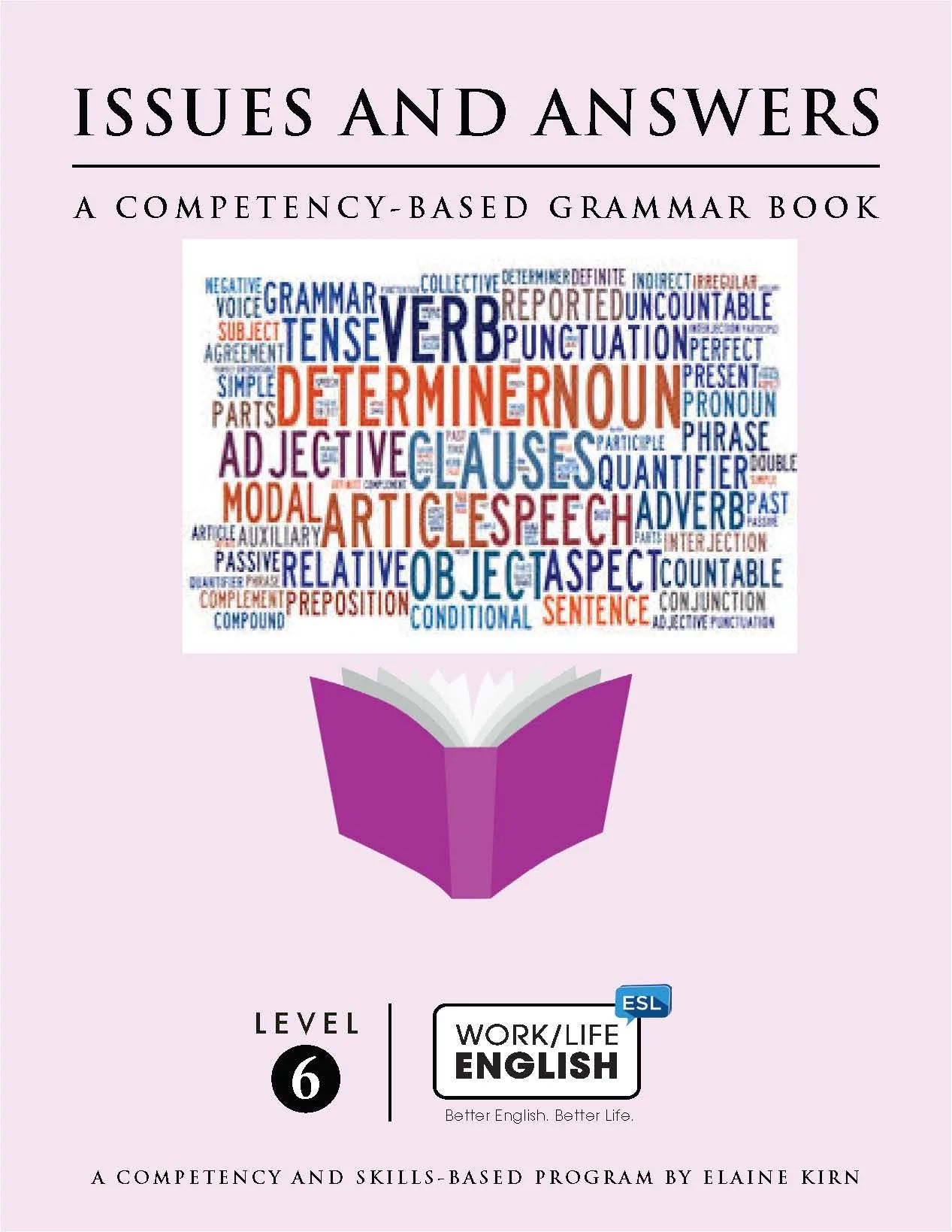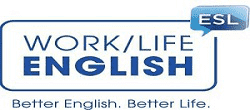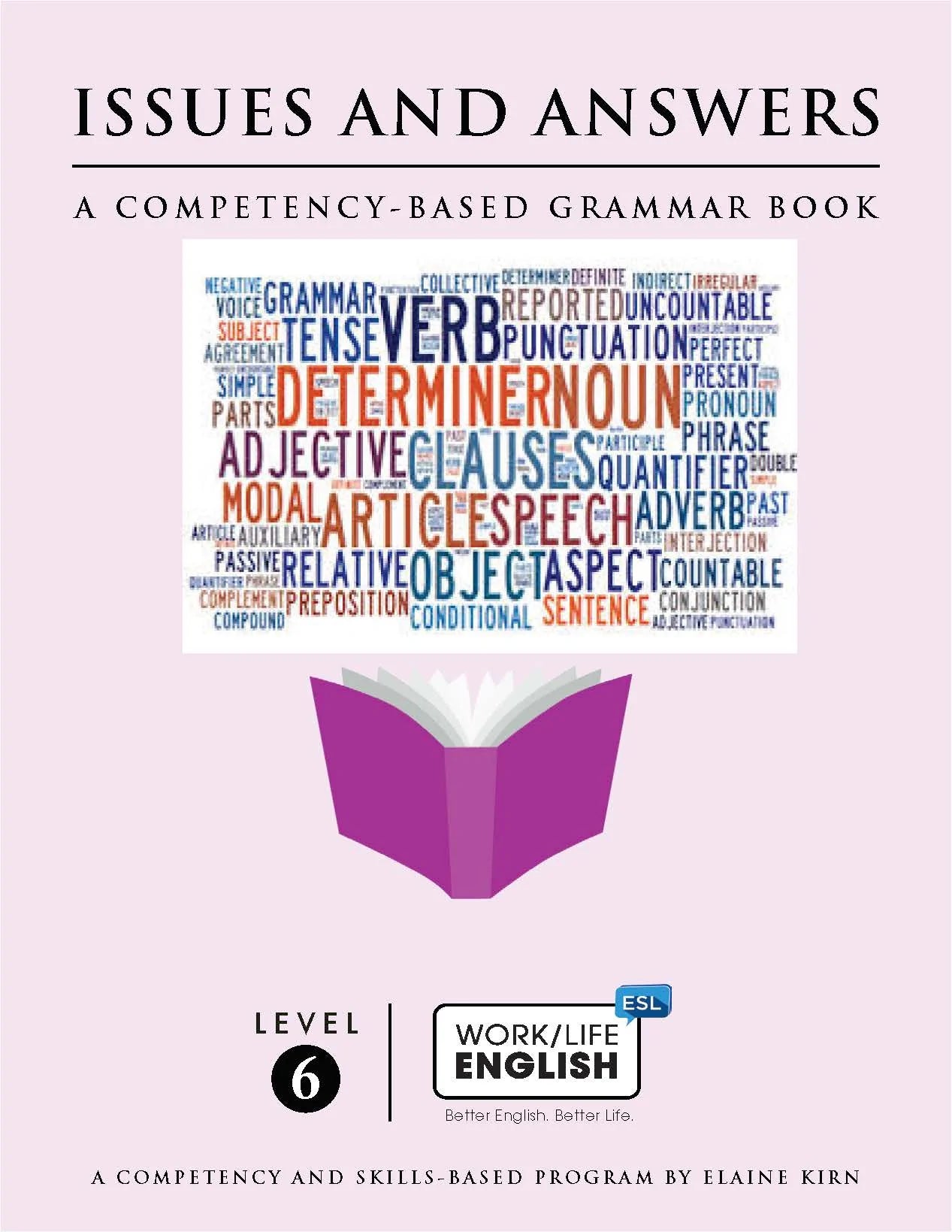Work/Life English
D-06a Work/Life English Level 6 Grammar - Issues & Answers (Digital Version)
D-06a Work/Life English Level 6 Grammar - Issues & Answers (Digital Version)
Description:
This student text is designed to equip learners with advanced grammatical proficiency and promote confident communication in educated American-English speech and writing. This grammar resource covers nearly all grammatical structures and rules needed for proficient American-English communication in various contexts.
Key Components:
- Unique grammar pretest and Post-test to identify areas of focus.
- Unique teaching/learning methodology for comprehensive grammar understanding.
- Ten chapters covering diverse grammar topics.
- Organized sub-lessons for targeted learning.
- Clear explanations, contrasts, lists of vocabulary, and exercises.
Pages:
192 pages
Who They're For:
- Instructors + Tutors of Secondary Students.
- Young Adults.
- Adults.
- Independent Learners & Home School Students for English Improvement
- ESL (English as a Second Language)
- EFL (English as a Foreign Language)
- Literacy Programs
- WIOA (Workforce Innovation and Opportunity Act)
- Career and College Preparation
- Corrections Institutions
What It Is:
The WLE Level 6 Competency-Based Grammar is the most extensive in the "grammar strand" of the coordinated WorkLife English program. The 192-page student text was designed to produce and assess mastery of nearly all grammatical structures and rules used in educated American-English speech and writing. As in the oral and written language-skills books it's associated with, its material fits into these ten (10) topics:
- Families • Health & Fitness • Government & Law • Business & Work • Science & Technology • Consumerism • Education • The Environment • Immigration • Travel & Recreation
Why You Need It:
Before ending formal language study, both non-native and native speakers want to feel that they've "covered and mastered" all structures needed to understand and produce language in an English-speaking environment. While assessing what learners do know or can do, this highest-level Grammar attempts to fill in the gaps.
What It Does:
WLE 6G has a unique organization, offering a different kind of teaching/learning methodology:
The book begins with a ten-page Grammar Pretest designed to reveal what text-users already know versus which specific learning points they could review or (re)learn. Each ten-item Test is based on the general grammar topic of the corresponding Chapter 1-10, which is divided into ten sub-lessons; the number of each four-choice text item 1-100 corresponds to a Lesson number.
By attempting to identify the one piece of language that's correct among four bolded choices in each test item--and then to "fix mistakes" by applying grammar rules to the other options, learners get to focus on the principles of appropriate language choices. They can then refer to the page(s) where that specific material is presented and practiced.
While integrating the subject matter listed above, each Chapter 1-10 targets a different general grammatical Topic or pair of Topics: 1. The Present & Present Perfect Tenses. 2. Nouns, Determiners, & Pronouns. 3. Infinitives; the Past. 4. Adjectives & Adverbs. 5. The Future. 6. Gerunds. 7. Modals. 8. The Passive; Phrasal Verbs. 9. Noun Clauses. 10. Adverb Clauses & Connecting Words.
Each of these Chapters is divided into ten (10) one- to three-page Lessons that cover the main divisions of that/those grammar Topics. A typical lesson starts with a fairly complete presentation of points, often with contrasts and/or lists of vocabulary that those principles apply to. For example, six Lessons in Chapter 1 compare the Present Continuous with the Simple Present, Non-Action with Action Verbs, the Present Perfect with the Simple Present, the Present Perfect Continuous with the Present Continuous, the Present Perfect Continuous with the Present Perfect, and impersonal it with there. The other four lessons "teach" different kinds of questions and answers. All exercises use material and visuals related to the Chapter Subject Matter, Families.
The other nine chapters follow a similar format and attempt to achieve comparable aims, with different content and grammar points, of course.
The book ends with a ten-page Grammar Post-test titled "What Do You Know Now?" Its purpose is to further assess progress and success, helping learners to "feel complete."
Print Version Available:
To buy Print Version click here!
Couldn't load pickup availability


